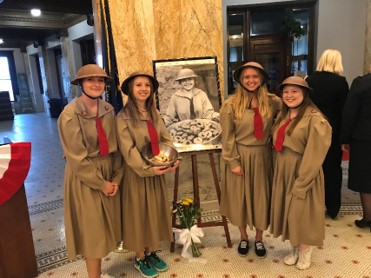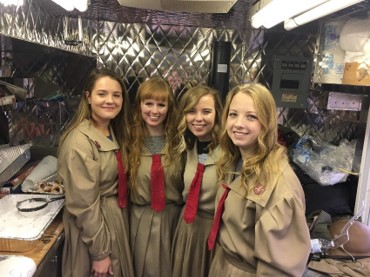What is a Doughnut Girl?
I asked myself that very question one day when a History Professor of mine told me he had relayed my name and those of a few other girls in the department as possible volunteers at the Huntington courthouse for a day in honor of Helen Purviance and the World War I Doughnut Girls. I agreed to help and, like any curious student of history, googled Helen and the girls when I got back to my room.

Helen Purviance was born in Huntington, IN on February 16, 1889. When America entered World War I, Helen went with the Salvation Army to provide service and care for the soldiers in France. In their huts stationed along the front lines of the war, the girls would serve coffee and provide spiritual guidance while they helped the soldiers write letters home and mend clothes. As Helen served the soldiers and lived the horrors of war alongside them, she became determined to bring a little bit of home to the front lines in the hopes it would provide some comfort to the soldiers. Out of the rations they were given (flour, sugar, baking powder, canned milk, and cinnamon), Helen created a recipe for doughnuts. The first day Helen and the other girls made the doughnuts, only 150 were produced. To increase production, Helen used an old wine bottle as a rolling pin, empty cans of condensed milk as cutters, and a percolator top to create the hole in the doughnuts. With these tools, the girls were able to produce 2,500 to 9,000 doughnuts a day. Helen and her fellow ‘Doughnut Girls’, as they became known, made it a daily routine to make the doughnuts, serve coffee, and talk and pray with the soldiers. With each doughnut she made, Helen said, “There was a prayer in my heart that somehow this home touch would do more for those who ate the donuts than satisfy a physical hunger.”
As I read about Helen’s story, several things stood out to me, but the one thing I kept circling back to was her birth place: Huntington, IN. This was the same small town my university got its name from and resided in. The streets I walked were the same ones Helen played on as a kid. Although we lived in different times and her world looked a lot different than mine, we found a connection in this little town that played a part in shaping both our stories.
When I got to the courthouse on the appointed day, I wasn’t sure what to expect. The Salvation Army gave us each uniforms like the one Helen wore and giant bowls of doughnuts, freshly made that morning from the same recipe Helen created almost a century ago. Much of the day involved serving the doughnuts, talking about Helen and the Doughnut Girls, and, of course, posing for photo ops with the public in attendance. It was in those moments I understood how Helen must have felt serving the doughnuts to the soldiers on the front lines. I didn’t know the stories of each mom that grabbed a doughnut or child I posed for a picture with, and they didn’t know mine. But the simple act of serving a doughnut let me share a moment of joy in the life of complete strangers.

The event included a small ceremony where local and state government officials and historians spoke about Helen and her life. A representative from the state of Indiana even came forward with an official document declaring April 14, 2018 as Helen Purviance Day. He also said a picture of Helen would hang in their government building for a month in her honor.
I wish I had the words to describe how I felt that day after the ceremony was over and I handed the uniform back. I have a heart for history and for telling the stories of women in the past. To be a part of honoring a girl whose story isn’t often told was an experience I will never forget.
Helen didn’t change the
world. You won’t find her story recorded in a history book or taught widely in
a classroom. But she did change the world of each of the soldiers she served on
the front lines. Every time I think of Helen, I’m reminded of the change a
single person can have on the world, even if that world is the life of a single
person.
-Emily VanderBent
Journalism and Marketing Intern
Girl Museum Inc.

I am so glad that stories like the Doughnut Girls is being passed on to another generation. Remember the First Friday in June is the Salvation Army’s National Doughnut Day!
It’s an honor to keep their story alive.